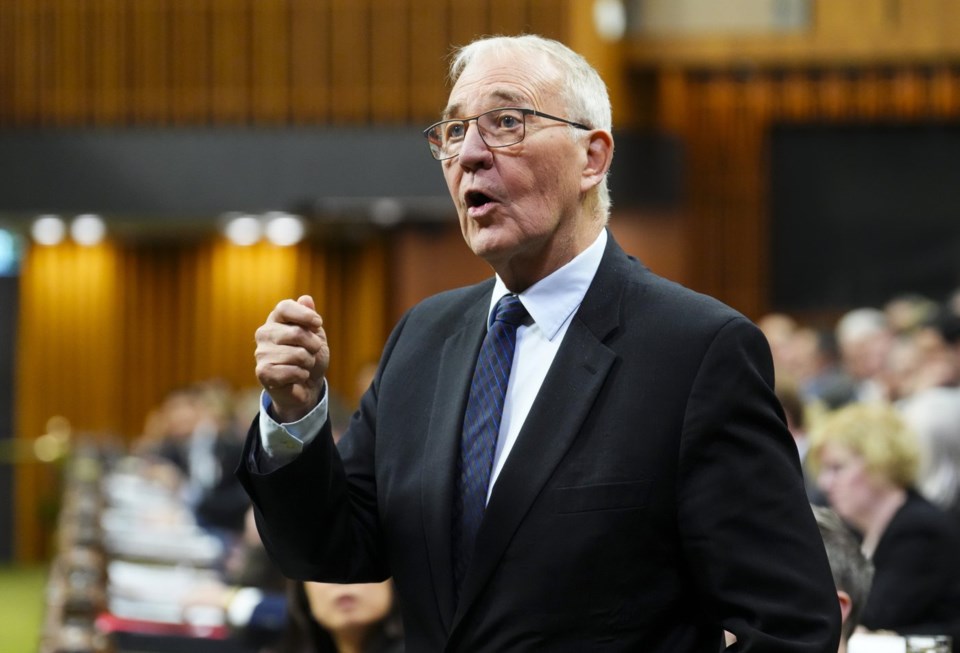OTTAWA — Defence Minister Bill Blair said Monday that he's ready to work with the incoming Donald Trump administration to speed up Canada's timeline to meet its NATO alliance spending targets.
Canada committed last year to meet the NATO members' pledge to spend at least two per cent of GDP on national defence and in July Prime Minister Justin Trudeau committed to hitting that target by 2032.
At a Canada Global Affairs Institute conference on that commitment in Ottawa Monday, Blair told military industry representatives that Canada will need some outside assistance to do it faster.
"They want us to go faster, and I'm ready to go faster," he said, when speaking about dealing with the next administration.
Blair said he is asking the defence industry and American officials for "help" because much of what the Canadian Armed Forces has to acquire comes from America's military-industrial complex, and the "regimes that are currently in place for military sales, congressional approvals — even the rules with respect to how I engage with their industries, frankly, are slowing us down."
He said 2032 is a "long way off" — even "too long." But Blair considers the conflict over two per cent to be "settled," since Ottawa has committed to a plan.
The comments come as the Liberal government is facing stepped-up criticism from U.S. politicians and others for falling far behind what other alliance members spend.
Sen. Jim Risch (R-Idaho) said in a public talk at the recent Halifax International Security Forum, a glitzy confab that gathers lawmakers and military leaders from around the world to discuss global security threats, that Canada's timeline "truly has to be better than that."
Trump has bristled over countries failing to meet the two per cent target, and Risch said president-elect would let out a "very large guffaw" at Canada's current timeline.
Goldy Hyder, head of the Business Council of Canada, said the 2032 target leaves Canada exposed heading into trade talks with the next administration.
"We're late to the game," he said. "You can't enter a year in which you're having a review and renewal of the most important trade agreement in our country on the back foot, you can't be on the defensive — and that's what we clearly are."
His organization released a report Monday calling on the government to bring in a raft of reforms to defence procurement, including to build up Canada's domestic defence industry base and speed up the plan to reach the NATO target to 2030, then raise it to three per cent by 2035.
Speaking at the 70th annual session of the NATO parliamentary assembly in Montreal on Monday, Prime Minister Justin Trudeau defended the Liberal record on defence spending, saying the government stepped up "big time" after it came to power in November 2015.
In 2015-16 Canada's defence spending had fallen below one per cent of GDP. It's expected to be 1.37 per cent this year.
Trudeau said the country is now on a "clear path" to meet the two per cent spending pledge, something Canada committed to spend annually at the 2023 NATO summit in Vilnius, Lithuania.
Canada consistently ranks at the back of the pack among NATO allies when it comes to how much it shells out on its military as a share of its GDP.
The office of Conservative Leader Pierre Poilievre said this summer that a future Conservative government would "work towards meeting Canada's NATO spending commitment," though the party has not produced its own timeline.
David Perry, President of the Canadian Global Affairs Institute, said Trudeau's government has stepped up defence spending in its time in office, but is still struggling to spend money fast enough.
"They're not yet getting money out the door at a rate that's going to get us to two per cent of GDP by 2032," he said. "The next five to six months are really going to tell us a lot about whether they can actually hit a really aggressive ramp-up the way they have been planning."
"It's just taking longer and slower than everybody had hoped."
This report by The Canadian Press was first published Nov. 25, 2024.
Kyle Duggan, The Canadian Press




